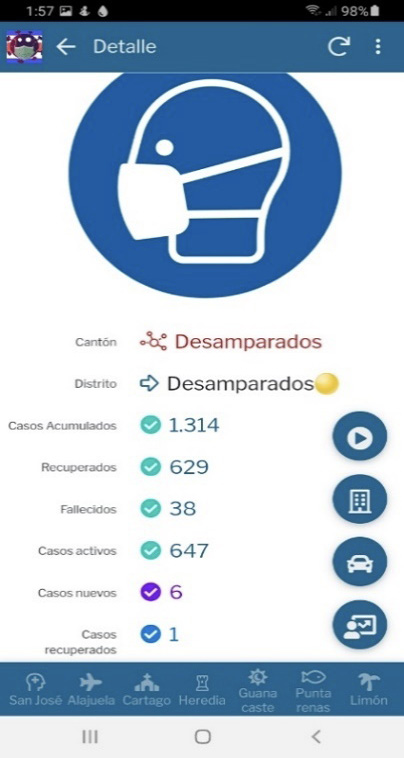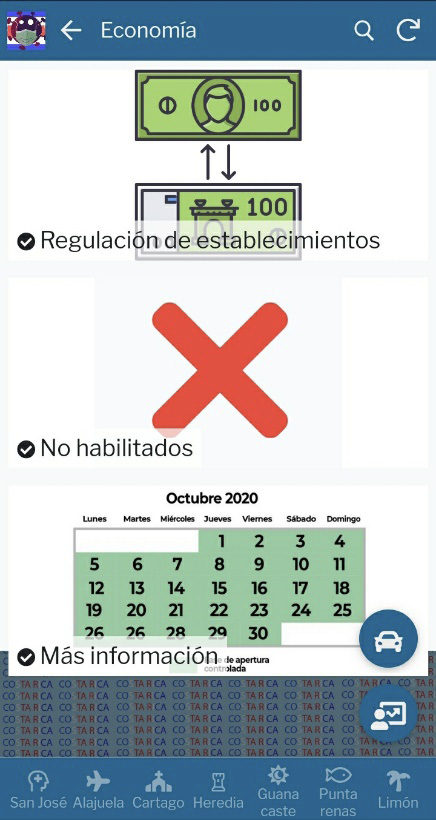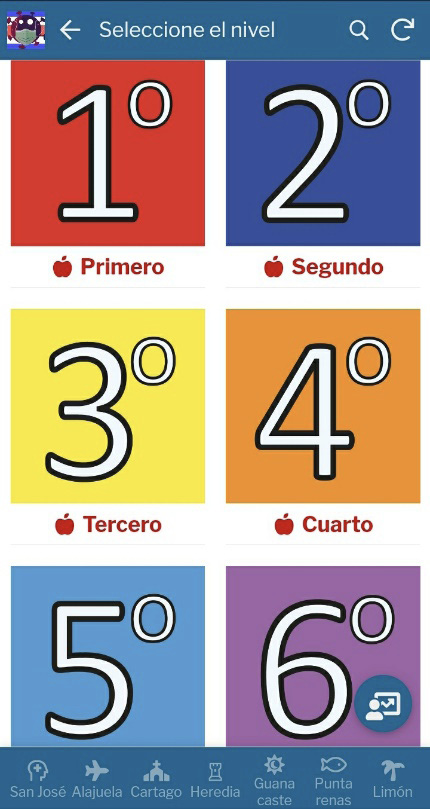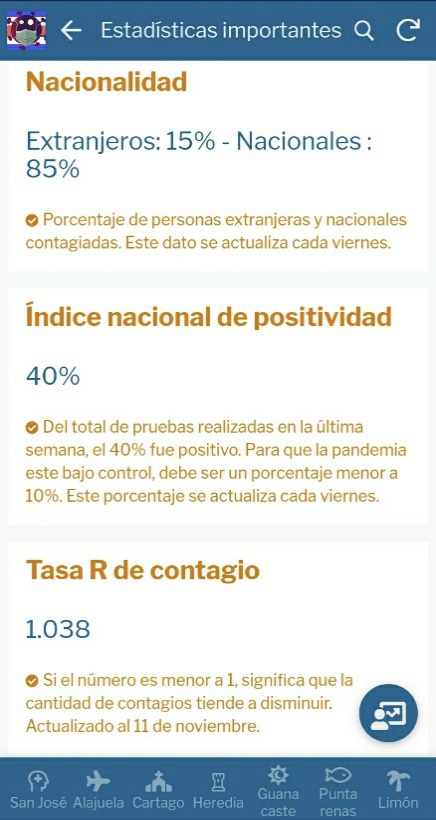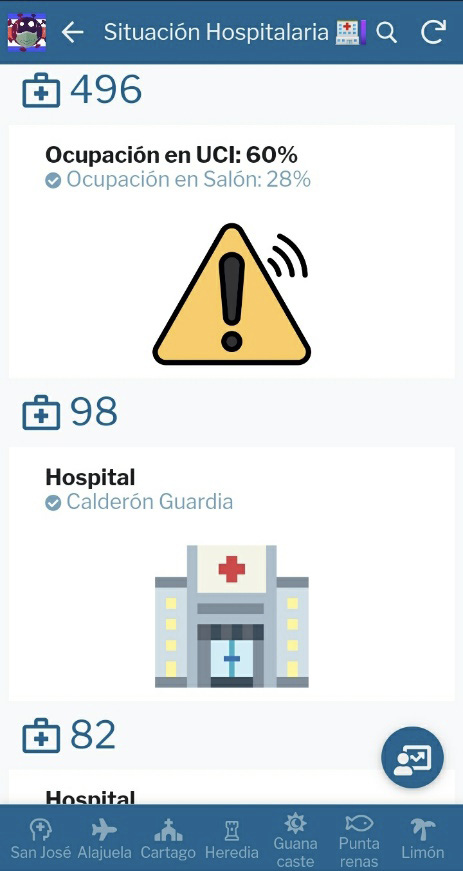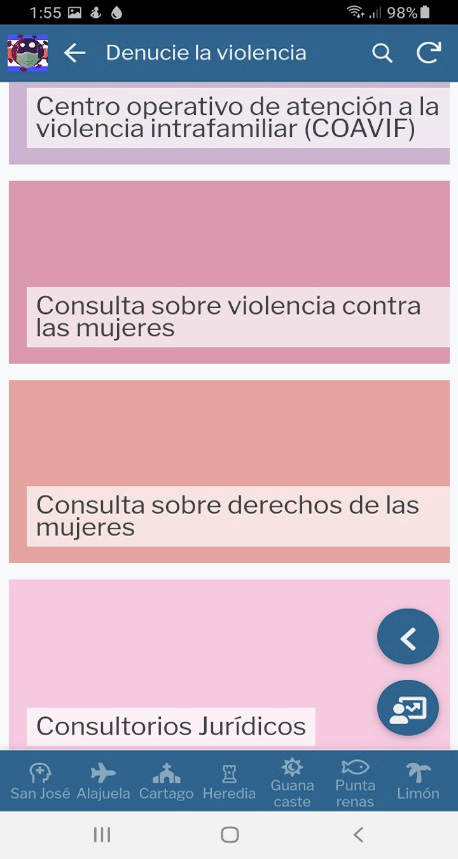Comprehensive information platform of COVID-19 in Costa Rica
Plataforma de información integral del COVID-19 en Costa Rica
Sebastian-Arturo Zuniga-Brenes1
Zuniga-Brenes, S.A. Comprehensive information platform of COVID-19 in Costa Rica . Tecnología en Marcha. Vol. 34, especial. Noviembre LAEDC 2021. Pág 62-72. https://doi.org/10.18845/tm.v34i6.5975
https://doi.org/10.18845/tm.v34i6.5975
Keywords
COVID-19; Costa Rica; development project; information and development; investigation project; avoid the infodemic.
Abstract
The availability of information locally and in an accessible way on active cases of COVID-19 is essential for the control of a pandemic because the population can be protected with greater accuracy and sensitivity. The Comprehensive Information Platform of COVID-19 in Costa Rica was created and was available during the first wave of COVID-19 and had a great impact on Costa Rican society and communities since approximately one million people received information from the Platform between July and December 2020.
Its construction specifically aimed at the different epidemiological moments of the country and the most relevant aspects of the Costa Rican agenda in the economic, social, and medical sector, made the platform fulfill the objective for which it was created since its instantaneous versatility made it adapt to the various moments of the pandemic in the country.
For the construction of this non-profit humanitarian project, we had the support of donations from Costa Rican civil society.
Palabras clave
COVID-19; Costa Rica; proyecto de desarrollo; información y desarrollo; proyecto de investigación; evitar la infodemia
Resumen
La disponibilidad de información a nivel local y de manera accesible de los casos activos del COVID-19 es esencial para el control de una pandemia debido a que la población puede protegerse con mayor exactitud y sensibilidad. La Plataforma de Información Integral del COVID-19 en Costa Rica fue creada y estuvo disponible durante la primera ola de COVID-19 y tuvo un gran impacto en la sociedad y las comunidades costarricenses ya que aproximadamente un millón de personas recibieron información de la Plataforma entre julio y diciembre del 2020.
Su construcción específicamente destinada a los diferentes momentos epidemiológicos del país y a los aspectos más relevantes de la agenda costarricense en el sector económico, social y médico, hizo que la plataforma cumpliera con el objetivo para el cual fue creada ya que su versatilidad instantánea hizo que se amoldara a los diversos momentos de la pandemia en el país.
Para la construcción de este proyecto humanitario sin fines de lucro, se contó con el apoyo de donaciones de la sociedad civil costarricense.
Introduction
The first detected case of COVID-19 in Costa Rica was on March 6th of 2020 [1]. The Pandemic declaration by the Health World Organization was 5 days after [2] and then was declared the National Emergency of the Centro-American country [3].
In the process of changing the national agenda into an “agenda for COVID-19”, Costa Rica had several issues; one of them was the communication with the citizens and local governors [4].
The information of the active cases of COVID-19 in Costa Rica was published daily by the Health Ministry on their official Facebook page (on an image sometimes with indistinguishable information) at a regional level ( but not district).
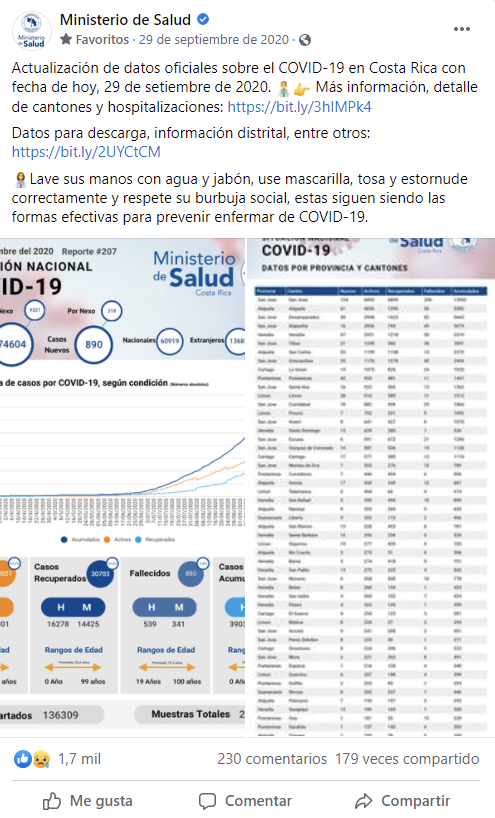
Figure 1. Example of a Facebook post by the Health Ministry with the country and regional (not district) epidemiological data. [5]
The district information was available on another website for download. If the people wanted to observe the active cases in their district, they would need to download a file (an excel) with thousands of rows (all the data of the country with a 7-day history). This process made the information inaccessible for the citizens since you may need a computer with a Microsoft Office license and several abilities with excel to visualize the data properly [6] [7].

Figure 2. Access of the excel file with all the epidemiological data. (a) Download bottom of the Excel file . (b) Excel with hundreds of rows and thousands of data [6].
That lack of progress in the usage of technology tools regarding accessibility for the citizens and even decision-makers made the cornerstone of the Comprehensive Information Platform of COVID-19 in Costa Rica. The Regional data could include de epidemiological information of multiple towns. The district data is a more local (single town) information.
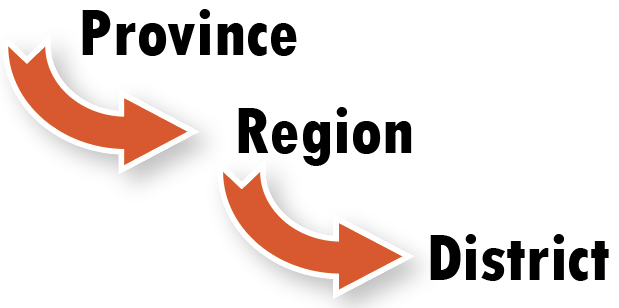
Figure 3. Territorial organization of Costa Rica.
The main objective of the Platform was the accessibility of the epidemiological district data of the pandemic all over Costa Rica since the empowering of the communities with correct information is one of the main methods of weakening the spread of COVID-19 [8, p. 6].
Methodology
The Platform was developed with an app engine called “Appsheet” which uses Google services and hosting. This decision made the Platform robust and secure since it had several security steps for sign in and it had support 24/7 in case a bug happened.
The Platform development began in May 2020 and was a process of analysis and constant change since those are the characteristics of this COVID-19 Pandemic. At that moment, the Platform had to:
•Change immediately in certain circumstances.
•Be secure.
•Be accessible.
•Display with high-quality standards and without errors all the epidemiological information of COVID-19 in Costa Rica at a district level.
•Display any other information that may help the efforts weakening the spread of COVID-19.
At the beginning of June, the Platform was done. The process of programming and development was fast because of the increasing number of active cases and the need for information of the population. All the data on the Platform was trusty since the only source was the data of the Ministry of Health of Costa Rica and the systems were connected in real-time.
The platform had a verification system that corrected any kind of mistakes made by the Ministry, specifically in the “new cases”. Sometimes, there were days on which the accumulated number of cases (AC) of day 2 were inferior from the data of day 1 and that is impossible. These mistakes in the data could have been related to administrative mistakes. If “AC” represents the “Accumulative Cases” and “NC” represents the New Cases:
 (1)
(1)
1.If [1] is True, the data had no mistakes. The premise was: “Tomorrow must have zero or more accumulate cases than today.”
2.If for some reason, the data had a mistake; (1) is False and the result was a negative number.
 (2)
(2)
As a correction, The Platform changed the number below zero (-#). So, the result in this case was that the New Cases (NC) was changed and equal to zero and the Accumulate Cases (AC) was updated to the AC day 2 info.
 (3)
(3)
 (4)
(4)
These changes are optimal and a must since those mistakes could have an impact on the popularity and thrust of the Platform.
There were irregularities with the management of the information and data registration of the Pandemic by the authorities [ 9], but this paper is not going deep inside that.
For security reasons, the Platform did not collect any kind of data from the users.
Release of the platform
The Platform was accessible since the users were able to access it from a web page and a mobile app available for iOS and Android users.
In the beginning, the people knew about the creation of the Platform thanks to communities and local committees that shared the content of the Platform. There was not a marketing budget.
After several meetings with the Institute of Technology of Costa Rica, Department of Communication and Marketing, the Platform was massively disclosed to the public.
Days after, the Platform was announced on several impressed and digital media and almost every popular TV Broadcast Network in the country [10] [11] [12]. As a result, the users of the Platform increased abruptly.

Figures 4. Media interviews with major TV Broadcast in Costa Rica. 4a) Interview with Noticias Repretel. 4b) Interview with Sinart 13.
Results
The Platform gave COVID-19 epidemiological information directly and indirectly approximately to 1 million citizens from July 15 th to December 31st.
The Platform was completely accessible and that is the main reason why in a small period, had the potential to impact so many people.
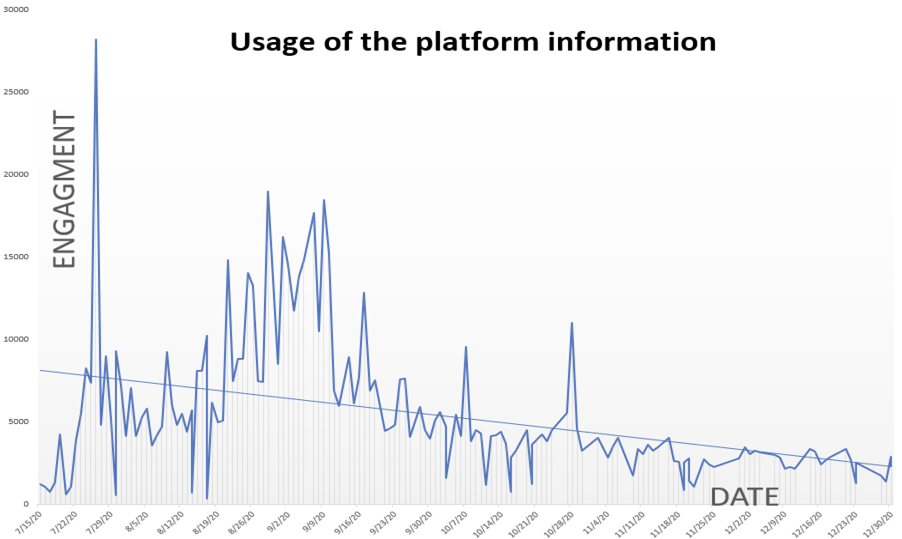
Figure 5. Usage of the Platform information. In y axis, is the Engagement represented by the number of the users of the Platform and the total impressions of the Facebook page. In x axis is the date from July 15 th to December 31st.
Also, some effects could higher up those statistics. For example, local Facebook pages used the information of the Platform and transformed those into infographic files (those numbers are contemplated in the approximation of the 1 million people), but then, those infographic flyers were sent via Whatsapp (these numbers were not possible to measure). In other words, there was a whole social network (WhatsApp) that was used by the people to divulge information given by the Platform. These statistics were impossible to collect and are unmeasurable.
Another positive aspect is that the Platform was an “All in one “; as the name said. The people were able to consult a variety of information. Since the COVID-19 pandemic had negative effects on every social activity, those changes created big issues in the economic and mental health of the people. The Platform included mental health advice, a national program of virtual education called “Aprendo en Casa” [13], information and “what to do”, if someone had COVID-19 symptoms, frequently questions regarding the pandemic, motivation videos, automobile and regional restrictions on commerce, as well as other sections of importance. The Platform did well, and no kind of problems were reported in the more than 219 000 minutes (5 months) that the Platform was active.
Platform View
|
|
|
|
Figures 6. Detail of the epidemiological data by district. This data was updated daily. |
Figure 7 . Economic section with all the commerce restrictions. |
|
|
|
|
Figure 8 . Menu for the program “Aprendo en Casa”. In this section, students could watch videos from the Ministry of Education regarding their level at school and high school. |
Figure 9 . Epidemiological technical information such as the Positivity National Rate and the R Rate (Reproduction number). |
|
|
|
|
Figure 10 . Hospital occupancy. |
Figure 11 . Menu with social approach and information regarding violence in the family. |
The platform was comprehensive since the Pandemic affected all levels of society. The last 6 figures reflects some of the final product that the platform gave to thousands of people. Also, there were other sections such as the vehicular restrictions, motivational videos, FAQ regarding the pandemic, airport, and immigration policies section.
The official logo of the Platform was an animated COVID-19 virus with a mask.
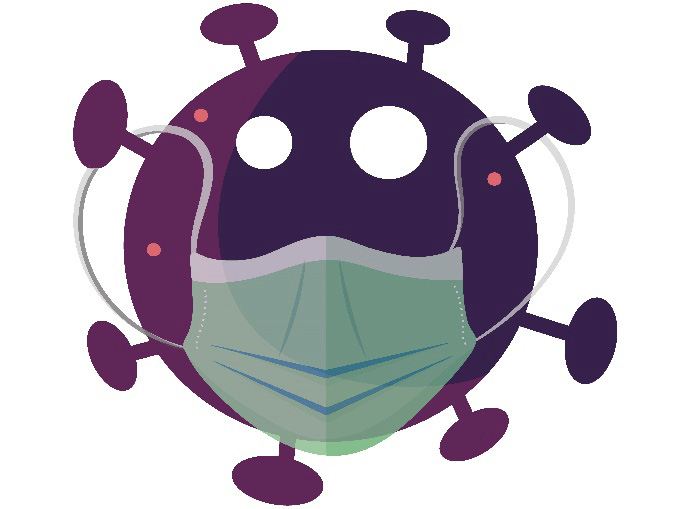
Figure 12 . Official logo of the Comprehensive Information Platform of COVID-19 in Costa Rica.

Figure 13 . Official Christmas logo of the Comprehensive Information Platform of COVID-19 in Costa Rica.
Conclusion
The main objective of the Platform was completed since approximately more than 1 million people had essential epidemiological information of the pandemic in Costa Rica thanks to the Comprehensive Information Platform of COVID-19 from July 15 th to December 31st.
It is impossible to determine if the Platform had a role in weakening the spread of COVID-19 in the country, but the fact is that approximately 20% of the population of Costa Rica had essential COVID-19 information thanks to this non-profit project.
Acknowledgment
To the anonymus people that donate to the project, My family, Esteban Arias Méndez, Iván Vargas Blanco, Irina Grajales Navarrete, close friends that supported the project in different ways.
This project is dedicated to all the families who lost a loved one to the COVID-19 pandemic.
References
[1] Ministerio de Salud de Costa Rica, “Ministerio de Salud de Costa Rica, CASO CONFIRMADO POR COVID-19 EN COSTA RICA,” 06 03 2020. [Online]. Available: https://www.ministeriodesalud.go.cr/index.php/centro-de-prensa/noticias/741-noticias-2020/1555-caso-confirmado-por-covid-19-en-costa-rica#:~:text=06%20de%20Marzo%20de%202020,un%20hospedaje%20de%20San%20Jos%C3%A9.. [Accessed 22 01 2021].
[2] Organización Mundial de la Salud, OMS, “COVID-19: cronología de la actuación de la OMS,” 27 04 2020. [Online]. Available: https://www.who.int/es/news/item/27-04-2020-who-timeline---covid-19. [Accessed 24 01 2021].
[3] Costa Rica Gobierno del Bicentenerio, “Declaratoria de Emergencia Nacional,” 19 03 2020. [Online]. Available: https://covid19.go.cr/declaratoria-de-emergencia-nacional/#:~:text=El%2016%20de%20marzo%202020,podr%C3%A1n%20ingresar%20nacionales%20y%20residentes.. [Accessed 24 01 2021].
[4] A. Navarro, “Alcalde de San Carlos arremete contra Gobierno por falta de apoyo para evitar propagación del COVID-19,” Noticias Monumental, 09 07 2020. [Online]. Available: https://monumental.co.cr/2020/06/09/alcalde-de-san-carlos-arremete-contra-gobierno-por-falta-de-apoyo-para-evitar-propagacion-del-covid-19/. [Accessed 26 01 2020].
[5] Ministerio de Salud, Costa Rica, “Ministerio de Salud,” 2020. [Online]. Available: https://www.facebook.com/msaludcr.
[6] K. Ramírez.C, “Universidad Estatal a Distancia,” 25 03 2020. [Online]. Available: https://www.uned.ac.cr/acontecer/a-diario/juncos/51-a-diario-/gestion-universitaria/3989-uned-crea-mapa-interactivo-sobre-el-registro-de-casos-del-covid-19-a-nivel-cantonal. [Accessed 24 01 2021].
[7] E. Carvajal, “Sala constitucional condena al gobierno a revelar datos sobre la pandemia,” 03 08 2020. [Online]. Available: https://www.crhoy.com/nacionales/sala-constitucional-condena-al-gobierno-a-revelar-datos-sobre-la-pandemia/. [Accessed 25 01 2021].
[8] Organización Mundial de la Salud, “Actualización de la estrategia frente a la COVID-19,” Organización Mundial de la Salud, Ginebra, Suiza, 2020.
[9] Contraloría General de la República, “DFOE-EC-IF-00006-2021 INFORME DE AUDITORÍA DE CARÁCTER ESPECIAL SOBRE LA INFORMACIÓN DE CONTAGIOS Y ORDENES SANITARIAS POR COVID-19,” CGR, San Jose, 2021.
[10] I. Grajales, “Estudiante del TEC crea app con las últimas alertas por COVID-19,” HOY EN EL TEC, Cartagi, 2020.
[11] A. Martínez, “¿Cuál pandemia?” es el nombre de una nueva app creada por estudiante del TEC,” Delfino.cr, San José, 2020.
[12] A. Pizarrro, “Estudiante crea app «¿Cuál pandemia? Costa Rica» para derribar mitos sobre emergencia sanitaria,” Am Prensa, San José, 2020.
[13] K. Díaz, “Apoyos educativos por televisión y radio enriquecen la educación a distancia,” Ministerio de Educación Pública, San José, 2020.
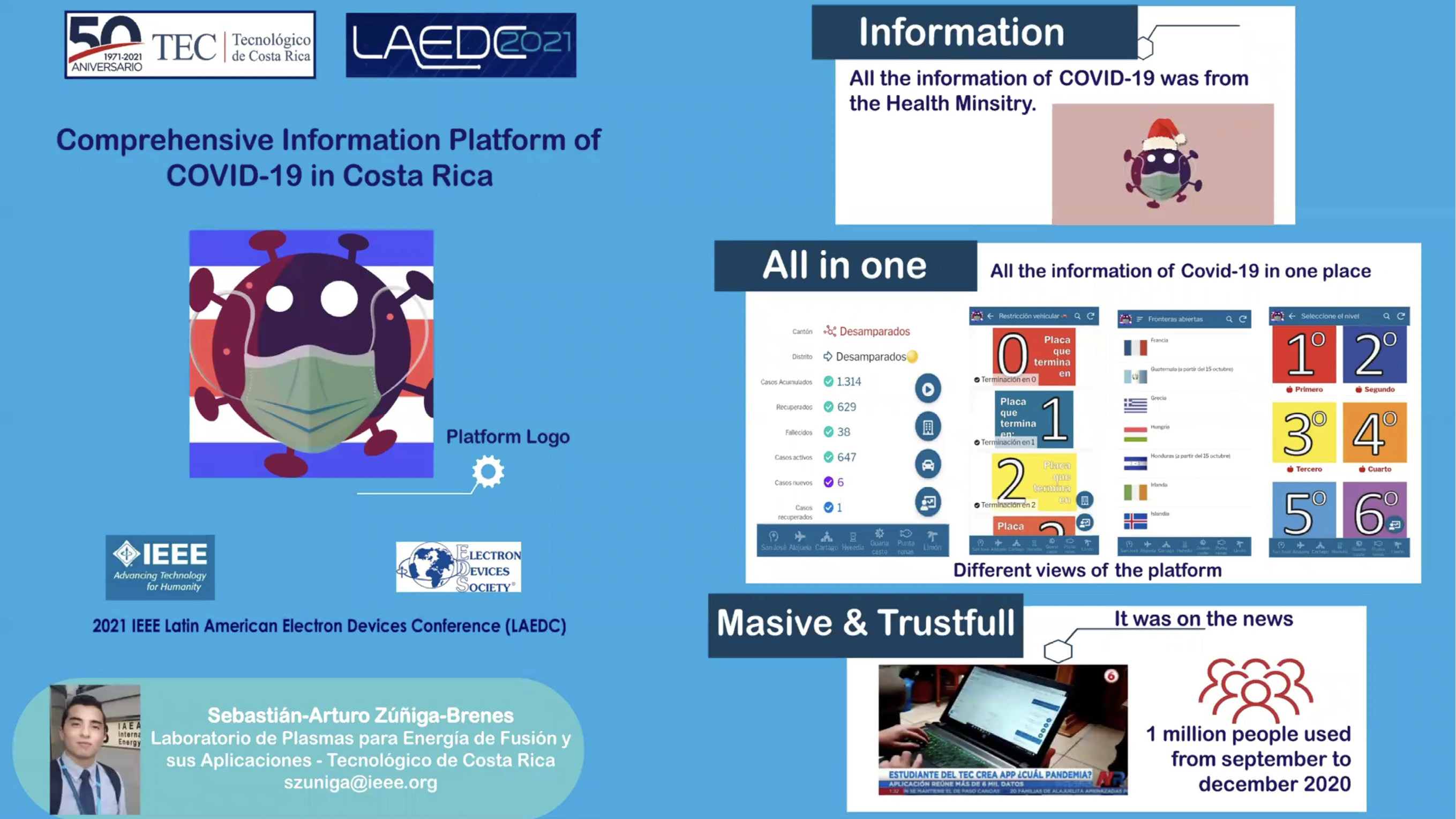
Ilustration 1. Presented Poster at LAEDC 2021.
1 Instituto Tecnológico de Costa Rica, Escuela de Física, Laboratorio de Plasmas para Energía de Fusión y sus Aplicaciones. Costa Rica.
Email: szuniga@ieee.org https://orcid.org/0000-0002-3376-4387
https://orcid.org/0000-0002-3376-4387
